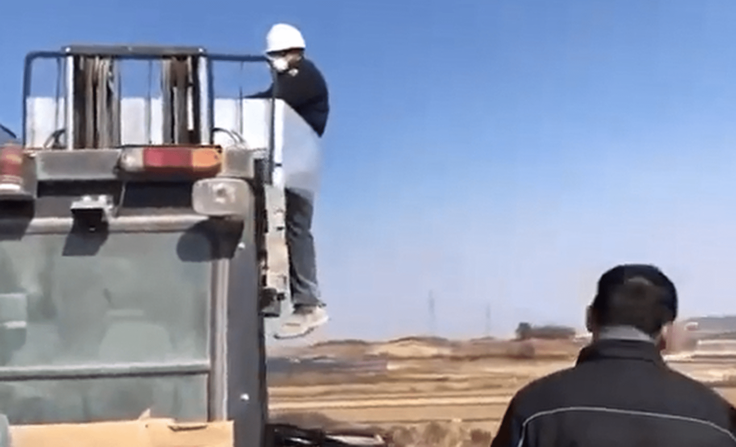Racism in South Korea: Video of Migrant Worker Tied to Bricks and Lifted by Forklift Sparks Outrage
Despite their contribution to the society, some Koreans still can't accep them.

A viral video showing a Sri Lankan migrant worker bound to bricks and lifted into the air by a forklift at a South Korean brick factory has triggered widespread outrage and intensified calls for stronger protections for foreign labourers.
According to The Straight Times, the incident took place in Naju, South Jeolla Province, and was made public on 24 July by the Gwangju Jeonnam Migrant Workers' Human Rights Network. The footage shows the man, reportedly in his 30s, wrapped in vinyl and tied to bricks before being hoisted off the ground by a forklift. Laughter is heard in the background, while one voice scolds the worker, saying: 'You should say sorry.' No bystanders intervened.
The victim is now suffering from psychological trauma, according to the civic group that shared the video. The organisation condemned the act, stating that the worker's basic dignity had been 'completely disregarded'.
🇰🇷#SouthKorea’s President ordered officials to find ways to prevent the mistreatment of migrant workers.
— Shen Shiwei 沈诗伟 (@shen_shiwei) July 25, 2025
A virtual video showing a 🇱🇰#SriLankan worker being moved by a forklift while tied up at a🇰🇷#SouthKorean factory sparked public outrage. pic.twitter.com/nMeBuRAQjU
President Lee Jae-myung publicly denounced the incident, calling it 'an intolerable act of violence against a vulnerable minority' and 'a blatant violation of human rights'. He pledged an active response through various government ministries to ensure the safety and dignity of migrant workers in South Korea.
Systemic Discrimination Under Scrutiny
While the video has ignited fresh debate, rights groups argue the abuse reflects a broader pattern of systemic racism and labour exploitation faced by South Korea's growing migrant workforce.
Civic organisations and officials alike have expressed shock, especially given South Korea's image as a modern democracy and global cultural power.
More Than a Million Migrant Workers in South Korea
As of May 2024, the number of foreign workers in South Korea surpassed one million, based on data from Statistics Korea. The migrant labour force increased by 87,000 from the previous year. Most workers are in their 30s (335,000), followed by 245,000 aged 15–29. Vietnamese nationals showed the sharpest growth, with 19,000 more arrivals compared to the previous year.
Although a government survey reported that 84.3% of migrant workers expressed life satisfaction and 90.4% said they wished to remain in the country, rights advocates argue that many continue to endure racism, harsh working conditions and legal vulnerabilities.
Calls for Reform as UN Eyes South Korea's Record
The UN Committee on the Elimination of Racial Discrimination has called on South Korea 12 times since 2009 to strengthen anti-discrimination legislation. Ongoing concerns include restrictions on job mobility, unsafe work environments, gender-based violence, arbitrary detention and deportation.
Ethnic Chinese workers and other migrant groups have also reported increased hostility, exacerbating existing tensions.
On 16 March 2025, more than 40 rights organisations held a rally in Seoul to mark the International Day for the Elimination of Racial Discrimination. Groups like the Migrants' Trade Union demanded equal treatment, legal protection and an end to racial violence.
Activists are preparing independent reports ahead of South Korea's scheduled review with the UN later this year, calling for stronger enforcement, reforms to immigration policy and greater accountability for abuses.
Despite government pledges, advocates stress that real change will require systemic reform and a cultural shift in how migrant workers are treated. The struggle for dignity and protection in South Korea, they warn, is far from over.
© Copyright IBTimes 2025. All rights reserved.





















